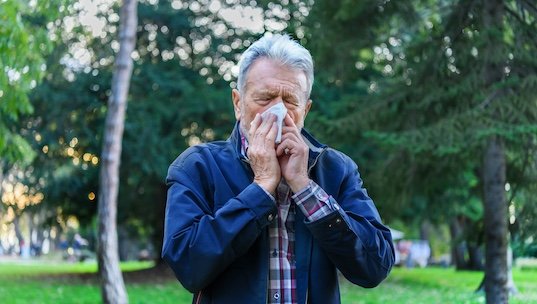Allergies and Asthma — What’s the Connection?
Sneezing and coughing during certain periods of the year? That may mean you have seasonal allergies, and you’re not alone.[1] Around 30% of adults in the U.S. report having allergy symptoms.[2]
What are seasonal allergies?
Seasonal allergies are when certain things in the environment, often called “triggers,” cause your immune system to overreact. Timing of seasonal allergies varies depending on where you live, but they typically occur in spring, summer, and fall. Pollen from trees, grass, and other plants is a common trigger for seasonal allergies. [1]
The link between allergies and asthma
Asthma is a chronic lung condition that affects breathing. Like allergies, asthma can be triggered by different things in your environment. “Allergic asthma” is when allergens like pollen, dust, and pets make asthma worse. [3]
Whether you suffer from seasonal allergies, asthma, or both, it’s possible to live a full life. If you have or think you may have allergies or asthma, reach out to your doctor. It’s important to get regular assessments and have a plan for managing your health. [3]
There are steps for managing allergies and allergic asthma that can help you breathe easier and participate fully in your life.
Identify your triggers. When you experience symptoms, consider what could be causing them. Common triggers are pollen, mold, dust mites, and pet dander. Paying attention to when and where your symptoms occur can help you start to understand what leads to symptoms. You can also talk to your doctor about getting tested for specific allergens. [CDC]
Adjust your environment. Once you know what allergens affect you, take a more active role in preventing your environment from triggering symptoms. For example, if pollen bothers you, try to stay indoors on windy days when pollen levels are high. Use air conditioning in your home to filter out allergens, and keep windows closed. If dust mites are a problem, wash your bedding regularly in hot water and use allergen-proof covers on pillows and mattresses.
If you have asthma, have an asthma action plan. An asthma action plan is a guide that helps you manage your asthma and allergies. Work with your healthcare provider to build a plan that helps you manage symptoms and asthma attacks. Consider including information about your triggers, medications, and what to do if you have an asthma attack. Share your action plan with family members and anyone in your support system so they know how to help you in case of an emergency.
Prepare to thrive through allergy season
You don’t have to shut down your life during allergy season. Whether you have seasonal allergies or allergic asthma, there are steps you can take to manage your health. It’s all about knowing your triggers, responding to your symptoms, and being prepared.

